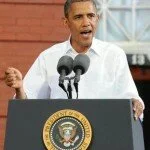 Just right back when US President Barack Obama yesterday concerned India’s trouble investment scenario, corporate affairs minister Veerappa Moily reportedly said that certain “international trade lobbies” have been spreading such stories that lead Obama misinformed about the country’s strong economic fundamentals.
Just right back when US President Barack Obama yesterday concerned India’s trouble investment scenario, corporate affairs minister Veerappa Moily reportedly said that certain “international trade lobbies” have been spreading such stories that lead Obama misinformed about the country’s strong economic fundamentals.
“Certain international lobbies like Vodafone are spreading this kind of a story and Obama was not properly informed about the things that are happening, particularly when India’s economic fundamentals are strong,” Moily told reporters.
Not even Moily, the Opposition party BJP and the Left that have opposed FDI, especially in retail and are suggesting the small trader, also attacked verbally at U.S. President for his Sunday’s remark, saying the country cannot open its markets just because Obama wants it.
On his remark over Indian economy, Obama said India has prohibited decisions on FDI proposals in too many sectors and for investors it was difficult to invest in important sector across India, lacking more job opportunities in both the countries and endorse another “wave” of economic reforms.
“If Obama wants FDI in retail and India does not want, then it won’t come just because he is demanding it,” BJP leader Yashwant Sinha angerly reacted over his remarks.
Describing Obama’s remark as “laughable”, BJP Vice-President Mukhtar Abbas Naqvi said, same country that itself facing economic problems, is giving us “a certificate on investment and economy” that is laughable.
Further reports said, Moily pointed out that unlike double crisis in the US and other countries in 2008 and 2010, there is no crisis in India.
Slowing growth of Indian investment climate is totally based on perception of individuals, entrepreneurs and investors and when it removed, in 2-3 months the country is back again with a kickstart.
Meanwhile, Obama’s remark over country’s deteriorating economical fundamental scenario is likely to see their strategy to pick up their own economy and market on their terms in India, to make growth and resolve the financial crisis with reduction of its burden.
